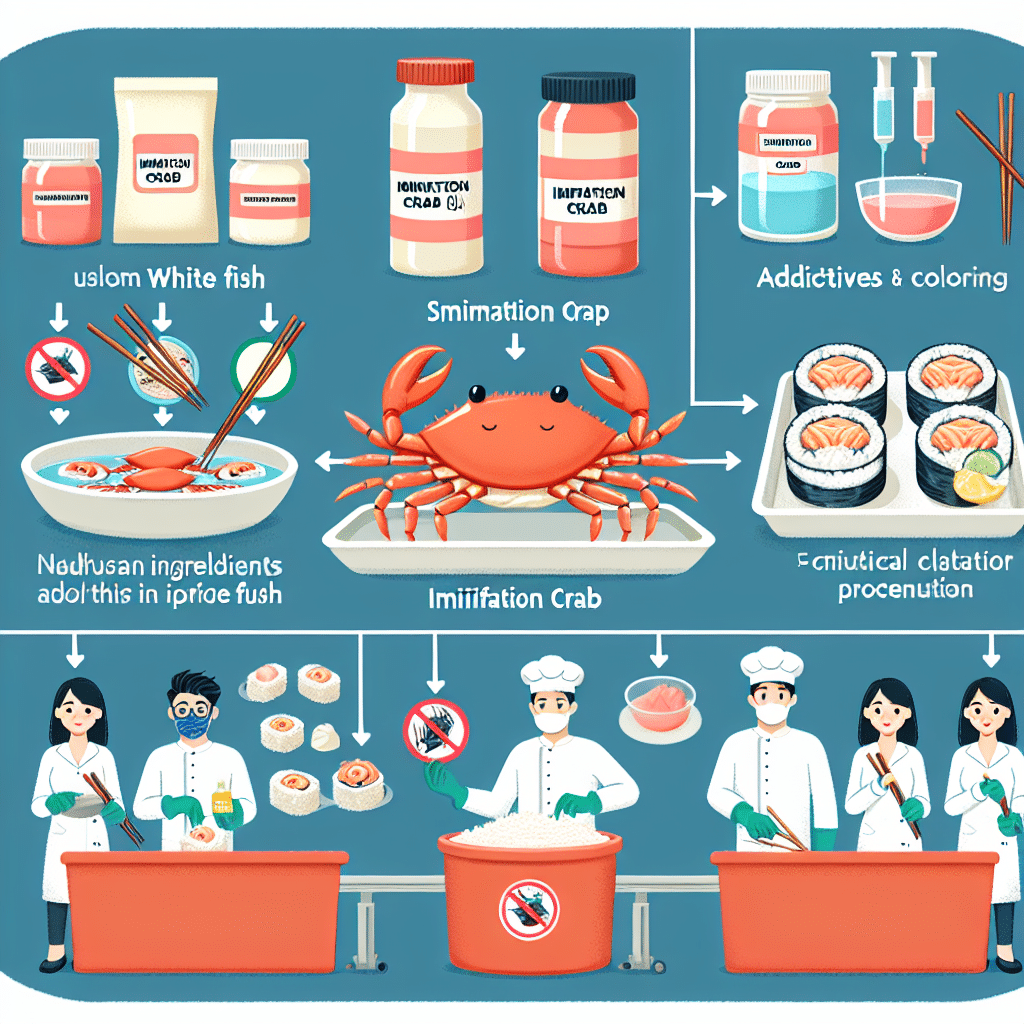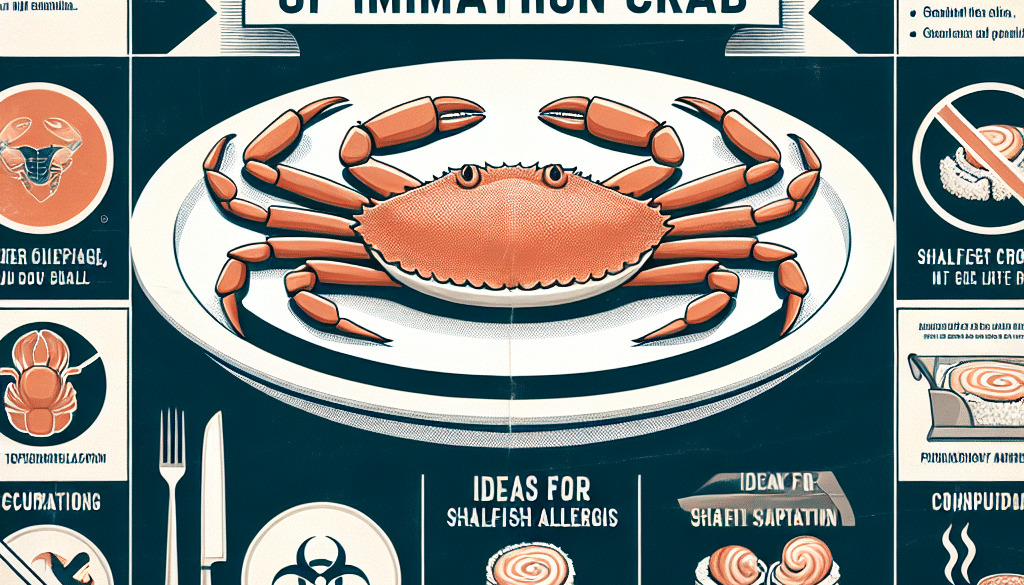The Safety and Consumption of Imitation Crab
-
Table of Contents
- Imitation Crab Safety and Consumption: A Comprehensive Guide
- Understanding Imitation Crab
- The Safety of Imitation Crab
- Nutritional Profile of Imitation Crab
- Environmental Impact and Sustainability
- Imitation Crab in Cuisine
- Choosing High-Quality Imitation Crab
- Conclusion: Balancing Safety, Nutrition, and Taste
- Explore ETprotein’s High-Quality Protein Products
Imitation Crab Safety and Consumption: A Comprehensive Guide

Imitation crab, also known as crab stick or kanikama, is a popular seafood alternative used in various dishes, from sushi to salads. Despite its widespread popularity, consumers often have questions about its safety, nutritional value, and how it compares to real crab meat. This article delves into the safety and consumption of imitation crab, providing valuable insights backed by statistics and research.
Understanding Imitation Crab
Before assessing the safety of imitation crab, it’s essential to understand what it is. Imitation crab is a processed seafood product made from surimi, a fish paste typically derived from white-fleshed fish like pollock. The surimi is mixed with other ingredients such as starch, egg whites, sugar, salt, and additives to mimic the flavor, color, and texture of crab meat.
The Safety of Imitation Crab
When it comes to food safety, imitation crab is generally considered safe for consumption when produced and handled according to food safety standards. However, there are several factors to consider:
- Allergens: Imitation crab may contain allergens such as shellfish, eggs, or wheat, which can be problematic for individuals with allergies.
- Additives: Some brands use monosodium glutamate (MSG) or other additives that may cause adverse reactions in sensitive individuals.
- Mercury Levels: Surimi-based products typically have lower mercury levels compared to certain types of real crab, making them a safer option in terms of mercury exposure.
It’s important to read labels carefully and choose products that meet your dietary needs and preferences.
Nutritional Profile of Imitation Crab
Imitation crab is lower in calories and fat compared to real crab meat but also has a different nutritional profile:
- Lower in protein: Imitation crab typically contains less protein than real crab.
- Higher in carbohydrates: Due to added starches and sugars, imitation crab has a higher carbohydrate content.
- Contains sodium: Imitation crab can be high in sodium, which may be a concern for individuals with hypertension.
For those watching their dietary intake, it’s crucial to consider these nutritional differences when incorporating imitation crab into meals.
Environmental Impact and Sustainability
The production of imitation crab can have a lower environmental impact than harvesting real crab due to overfishing concerns. Surimi is often made from abundant fish species, which can be a more sustainable option. However, the sustainability of imitation crab also depends on the fishing practices of the surimi source and the environmental footprint of the production process.
Imitation Crab in Cuisine
Imitation crab is versatile and can be used in a variety of dishes:
- Sushi rolls
- Seafood salads
- Crab cakes
- Pasta dishes
Its affordability and convenience make it a popular choice for home cooks and professional chefs alike.
Choosing High-Quality Imitation Crab
To ensure the best quality and safety, consumers should:
- Check the ingredient list for additives and allergens.
- Opt for brands with transparent sourcing and sustainability practices.
- Look for products with minimal preservatives and artificial ingredients.
By being selective, consumers can enjoy imitation crab as a safe and tasty part of their diet.
Conclusion: Balancing Safety, Nutrition, and Taste
Imitation crab is a safe and convenient seafood option when chosen carefully and consumed in moderation. While it differs nutritionally from real crab, it can be part of a balanced diet. Consumers should be mindful of allergens, additives, and sodium content while considering the environmental benefits of choosing sustainable seafood alternatives.
Explore ETprotein’s High-Quality Protein Products
For those seeking alternative protein sources, ETprotein offers a range of organic bulk vegan proteins that are non-GMO and allergen-free. Their products, including various seed and bean proteins, provide excellent options for individuals looking to diversify their protein intake with environmentally conscious choices.
About ETprotein:
ETprotein, a reputable protein and L-(+)-Ergothioneine (EGT) Chinese factory manufacturer and supplier, is renowned for producing, stocking, exporting, and delivering the highest quality organic bulk vegan proteins and L-(+)-Ergothioneine. They include Organic rice protein, clear rice protein, pea protein, clear pea protein, watermelon seed protein, pumpkin seed protein, sunflower seed protein, mung bean protein, peanut protein, and L-(+)-Ergothioneine EGT Pharmaceutical grade, L-(+)-Ergothioneine EGT food grade, L-(+)-Ergothioneine EGT cosmetic grade, L-(+)-Ergothioneine EGT reference grade and L-(+)-Ergothioneine EGT standard. Their offerings, characterized by a neutral taste, non-GMO, allergen-free attributes, with L-(+)-Ergothioneine purity over 98%, 99%, cater to a diverse range of industries. They serve nutraceutical, pharmaceutical, cosmeceutical, veterinary, as well as food and beverage finished product distributors, traders, and manufacturers across Europe, USA, Canada, Australia, Thailand, Japan, Korea, Brazil, and Chile, among others.
ETprotein specialization includes exporting and delivering tailor-made protein powder and finished nutritional supplements. Their extensive product range covers sectors like Food and Beverage, Sports Nutrition, Weight Management, Dietary Supplements, Health and Wellness Products, and Infant Formula, ensuring comprehensive solutions to meet all your protein needs.
As a trusted company by leading global food and beverage brands and Fortune 500 companies, ETprotein reinforces China’s reputation in the global arena. For more information or to sample their products, please contact them and email sales(at)ETprotein.com today.












